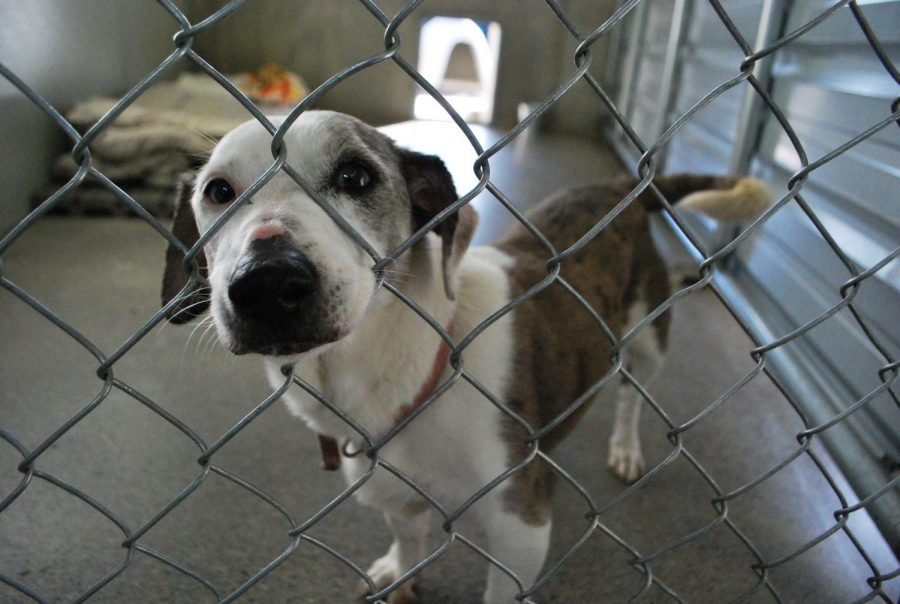OPINION: Adopt, don’t shop!
Shelters are most ethical way to find furry friends
APRIL SAYSON | DAILY EVERGREEN FILE
The Whitman County Humane Society is home to many animals who could be your new best friend.
September 15, 2022
We as humans love our furry friends. There is nothing better than a dog or cat waiting for you when you get home every day.
Unfortunately, it seems that for some people the breed of their pet is more important than the love they can give them.
People nowadays spend up to thousands of dollars to get a purebred animal of their choice, when there are multitudes of animals waiting to be loved and adopted in shelters.
The Humane Society of The United States has recently saved 4,000 beagles from a mass breeding facility from an inhumane breeding facility that received multiple Animal Welfare Act Violations, including a lack of food.
The Spokane Humane Society received 24 of the beagle puppies in late August that need support. Spokane animal shelters reached max capacity this past July, especially for dog kennels, according to KREM2.
Pets in need have not been a recent trend. Around 6.3 million pets enter U.S. animal shelters nationwide every year, according to the American Society for the Prevention of Cruelty to Animals. Of those, approximately 3.1 million are dogs and 3.2 million are cats.
Emma Baldwin, junior entrepreneurship and marketing major, fosters cats and encourages others to foster animals as well.
Baldwin said that fostering is not a new thing for her, and has always been an important part of her life. She is an advocate for adopting animals from shelters instead of adopting them through pet stores.
When going to a Petco one day in her hometown, Baldwin heard from several employees that a young mother cat who had just given birth was separated from her litter two days after the birth. Frustrated by the situation, Baldwin adopted the mother cat to give her a better home.
“She was completely separated and put up for adoption, it was so disrespectful,” Baldwin said.
Pet stores are also infamous for buying pets from large-scale puppy mills which treat animals horrifically; in puppy mills, thousands of animals are stored in small plastic bins, with oftentimes no food or water, according to The Dodo.
Shelters put a ton of time and money into giving animals the socialization and medical care to live a healthy life. Meanwhile, puppy mills only care about one thing: profit.
While some countries, such as the United Kingdom, have made steps in banning third-party sales of puppies and kittens, the U.S. federal government has yet to address the issue of puppy mills. Avoiding pet stores and supporting shelters is the way to go.
Junior finance major Siena Vetto has two adopted cats from shelters as well as a dog from a family friend that would have ended up in a shelter.
Vetto said a lot of people tend to avoid shelters because they want the experience of raising a pet and seeing it grow. However, she was pleasantly surprised after having a volunteering experience at The Humane Society in Bellevue.
“I kind of assumed at shelters there would be mainly older pets, but especially with cats they have a lot of kittens,” Vetto said.
A lot of young dogs and cats get abandoned at a young age because their original owners realize that they cannot fully take care of them. Therefore, it is important to understand the commitment of getting an animal.
The Humane Society lets potential owners interact with the pets to ensure they are a good fit for the person or family.
“When a pet has specific needs, they make that really clear to the families,” Vetto said.
The Humane Society runs a foster program, so there are more animals than it appears that need homes as well. Vetto said that the Humane Society prioritizes keeping litters together, so they can grow together and learn from one another.
“The thing that the Humane Society in Bellevue is doing is they have outside people who take care and foster the pets before they go to the shelters themselves,” Vetto said. “So even what you are seeing in the shelter is not all the pets that are available.”
Another reason people do not go to shelters is that they want a particular breed, so they go through a breeder. There are valid reasons to seek out certain breeds, such as allergies or special care needs, but before going through a breeder make sure to check your local shelters and see if they already have the breed you are looking for.
Going through a shelter is also much more cost-effective than going through a breeder. Puppies usually cost between $400 and $2000 from a breeder.
As a person who has been an active volunteer walker and trainer for the Humane Society, I know from first-hand experience that volunteers put a lot of time and energy into training animals so they can absolutely thrive in their new homes.
You can help by donating to the Humane Society or by adopting or fostering animals that need homes. For more information about adoption, view your local shelter’s website!
Remember that “adopt don’t shop” is a saying we should keep close to our hearts when searching for our next furry friend!











